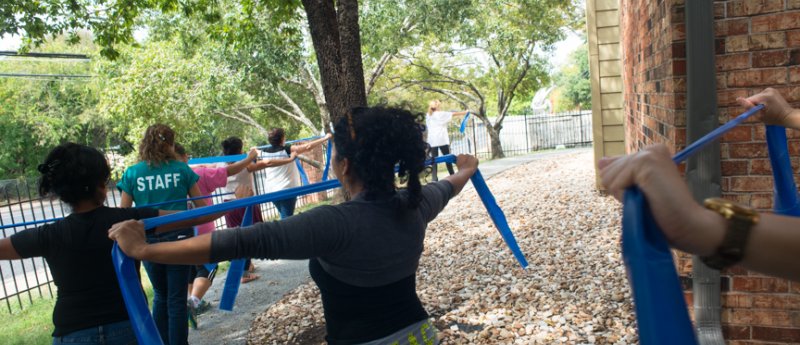Creating Healthier, More Equitable Communities
The places where we live, learn, work, and play all contribute to our ability to become and stay healthy. A Culture of Health means everyone has the basics to be as healthy as possible—like access to quality education, employment opportunities, and safe, clean neighborhoods across rural and urban settings.
-
Housing organizations and health providers have realized they are natural allies. They serve the same people living in the same places, and are learning that their missions are aligned: improving housing quality and stability can lead to better population health outcomes. A growing emphasis on prevention within the health care sector has housing organizations eager to help. But partnering across sectors can be bumpy.
September 20, 2017
|P4A Spark
| -
Nutrition and Physical ActivityStudents at two-year colleges at risk of food insecurity during economic downturn
Students attending two-year colleges are more likely to be food insecure than other adults, particularly during economic recessions. Though we don’t identify the underlying causes of this trend, the high levels of food insecurity among two-year students should push policymakers to reexamine how the Supplemental Nutrition Assistance Program (SNAP, formerly known as food stamps) and other supportive services can best assist these students.
September 12, 2017
|P4A Spark
| -

One of six case studies featured in our new report Emerging Strategies for Integrating Health and Housing, Foundation Communities’ success highlights how housing leaders can partner with health care allies to better the lives of low-income residents. Its early successes show that we must break down cross-sector silos and engage new partners to make progress on social determinants of health.
August 29, 2017
|P4A Spark
| -
 Children and FamiliesSpreading actionable evidence on early childhood education and health
Children and FamiliesSpreading actionable evidence on early childhood education and healthOver the last several decades, a robust body of evidence has emerged linking early childhood investments—in high-quality childcare, early learning, home visiting, and more—to better health and well-being, sometimes years later in adulthood. Especially for low-income children, these supports can help mitigate the negative effects of challenging or stressful environments, and set them on a life-long trajectory of positive health development.
August 10, 2017
|P4A Spark
| -
 Children and FamiliesNow is the time to move forward on paid family and medical leave
Children and FamiliesNow is the time to move forward on paid family and medical leaveA solid majority of Americans, from both parties, endorse paid family and medical leave. There are proposals for paid leave in Congress and the President’s budget. A recent bipartisan proposal from an AEI/Brookings working group, of which I am a member, is also garnering a lot of attention. This is an opportune time to enact a federal policy to provide paid family and medical leave to all employees.
August 2, 2017
|P4A Spark
| -
Children and FamiliesEmerging Strategies for Integrating Health and Housing
Elaine Waxman and Corianne Scally of the Urban Institute Research Hub have released a new study examining emerging interventions that integrate housing and health services for low-income people, focusing on interventions where health care organizations have taken a significant leadership role.
July 19, 2017
|Evidence
| -
 Nutrition and Physical ActivityFor socially isolated seniors, Meals on Wheels delivers more than food
Nutrition and Physical ActivityFor socially isolated seniors, Meals on Wheels delivers more than foodAs we close out Older Americans Month, we reflect on how Meals on Wheels—and programs like it—can offer critical support for its clients’ physical and mental health.
May 31, 2017
|P4A Spark
| -
Children and FamiliesGender Differences in the Benefits of an Influential Early Childhood Program
ABC/CARE was a comprehensive, birth through age five early childhood development program that included early health, nutrition, parental education and early childhood education. Complementing their recent cost-benefit analysis of the ABC/CARE program, Dr. James Heckman and his team look at the differences in outcomes based on gender in their paper, Gender Differences in the Benefits of an Influential Early Childhood Program.
May 11, 2017
|Evidence
| -

Despite the billions of dollars spent each year on health care in this country, too many Americans are falling behind on key indicators of health and well-being. Yet, health care is just one piece of the puzzle. In communities across the country, people are struggling to access stable employment, safe neighborhoods, reliable transportation, and high-quality education. A growing body of evidence on these broader determinants of health makes it clear that these things matter (a lot) to our health and well-being.
April 20, 2017
|P4A Spark
| -
Children and FamiliesThe Lifecycle Benefits of an Influential Early Childhood Program
The research team found that high-quality early childhood education programs had the potential to deliver a 13.7% per child, per year return on investment through better outcomes in health, education, and employment. The economic return of the two programs was substantially higher than had been previously found for preschool programs serving 3- to 4-year-olds, which have previously estimated only a 7-10% return on investment.
December 12, 2016
|Evidence
| -

Together, RWJF, P4A, Urban Institute, and our grantees are working to build a Culture of Health where everyone has the opportunity to live as healthy a life as possible.
December 5, 2016
|P4A Spark
| -
Income and WealthEvaluating the Chicago Future Fund & Guaranteed Income Policy Work
Incarceration plays a major role in creating and maintaining the racial wealth gap. And, while guaranteed income (GI) programs have been proposed by academics, legislators, and community members across the country as a way to address the racial wealth gap, little research exists on targeted GI initiatives for justice system-impacted people.
August 15, 2023
|